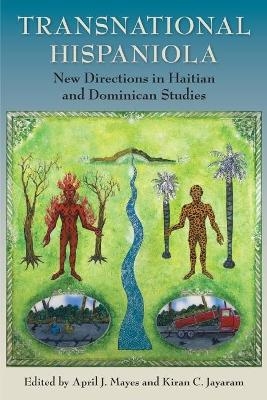
Transnational Hispaniola
New Directions in Haitian and Dominican Studies
Seiten
2022
University Press of Florida (Verlag)
978-1-68340-268-8 (ISBN)
University Press of Florida (Verlag)
978-1-68340-268-8 (ISBN)
In addition to sharing the Caribbean island of Hispaniola, Haiti and the Dominican Republic share a complicated and at times painful history. Yet Transnational Hispaniola shows that there is much more to the two nations’ relationship than their perceived antagonism.
In addition to sharing the Caribbean island of Hispaniola, Haiti and the Dominican Republic share a complicated and at times painful history. Yet Transnational Hispaniola shows that there is much more to the two nations' relationship than their perceived antagonism. Rejecting dominant narratives that reinforce opposition between the two sides of the island, contributors to this volume highlight the connections and commonalities that extend across the border, mapping new directions in Haitianist and Dominicanist scholarship.
Exploring a variety of topics including European colonialism, migration, citizenship, sex tourism, music, literature, political economy, and art, contributors demonstrate that alternate views of Haitian and Dominican history and identity have existed long before the present day. From a moving section on passport petitions that reveals the familial, friendship, and communal networks across Hispaniola in the nineteenth century to a discussion of the shared music traditions that unite the island today, this volume speaks of an island and people bound together in a myriad of ways.
Complete with reflections and advice on teaching a transnational approach to Haitian and Dominican studies, this agenda-setting volume argues that the island of Hispaniola and its inhabitants should be studied in a way that contextualizes differences, historicizes borders, and recognizes cross-island links.
Contributors: Paul Austerlitz, Nathalie Bragadir, Raj Chetty, Anne Eller, Kaiama L. Glover, Maja Horn, Regine Jean-Charles, Kiran C. Jayaram, Elizabeth Manley, April Mayes, Elizabeth Russ, Fidel J. Tavárez, Elena Valdez
Publication of the paperback edition made possible by a Sustaining the Humanities through the American Rescue Plan grant from the National Endowment for the Humanities.
In addition to sharing the Caribbean island of Hispaniola, Haiti and the Dominican Republic share a complicated and at times painful history. Yet Transnational Hispaniola shows that there is much more to the two nations' relationship than their perceived antagonism. Rejecting dominant narratives that reinforce opposition between the two sides of the island, contributors to this volume highlight the connections and commonalities that extend across the border, mapping new directions in Haitianist and Dominicanist scholarship.
Exploring a variety of topics including European colonialism, migration, citizenship, sex tourism, music, literature, political economy, and art, contributors demonstrate that alternate views of Haitian and Dominican history and identity have existed long before the present day. From a moving section on passport petitions that reveals the familial, friendship, and communal networks across Hispaniola in the nineteenth century to a discussion of the shared music traditions that unite the island today, this volume speaks of an island and people bound together in a myriad of ways.
Complete with reflections and advice on teaching a transnational approach to Haitian and Dominican studies, this agenda-setting volume argues that the island of Hispaniola and its inhabitants should be studied in a way that contextualizes differences, historicizes borders, and recognizes cross-island links.
Contributors: Paul Austerlitz, Nathalie Bragadir, Raj Chetty, Anne Eller, Kaiama L. Glover, Maja Horn, Regine Jean-Charles, Kiran C. Jayaram, Elizabeth Manley, April Mayes, Elizabeth Russ, Fidel J. Tavárez, Elena Valdez
Publication of the paperback edition made possible by a Sustaining the Humanities through the American Rescue Plan grant from the National Endowment for the Humanities.
April J. Mayes, associate professor of history at Pomona College, is the author of The Mulatto Republic: Class, Race, and Dominican National Identity. Kiran C. Jayaram, assistant professor of anthropology at the University of South Florida, is coeditor of Keywords of Mobility: Critical Engagements.
| Erscheinungsdatum | 02.04.2022 |
|---|---|
| Zusatzinfo | 5 b/w illustrations |
| Verlagsort | Florida |
| Sprache | englisch |
| Maße | 152 x 229 mm |
| Gewicht | 333 g |
| Themenwelt | Sachbuch/Ratgeber ► Geschichte / Politik ► Allgemeines / Lexika |
| Geisteswissenschaften ► Geschichte ► Regional- / Ländergeschichte | |
| Geisteswissenschaften ► Sprach- / Literaturwissenschaft ► Anglistik / Amerikanistik | |
| Geisteswissenschaften ► Sprach- / Literaturwissenschaft ► Literaturwissenschaft | |
| Sozialwissenschaften ► Ethnologie | |
| Sozialwissenschaften ► Politik / Verwaltung ► Europäische / Internationale Politik | |
| Sozialwissenschaften ► Soziologie | |
| ISBN-10 | 1-68340-268-5 / 1683402685 |
| ISBN-13 | 978-1-68340-268-8 / 9781683402688 |
| Zustand | Neuware |
| Haben Sie eine Frage zum Produkt? |
Mehr entdecken
aus dem Bereich
aus dem Bereich


